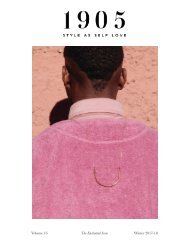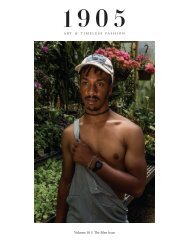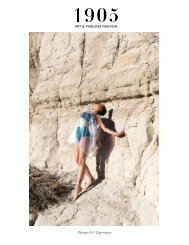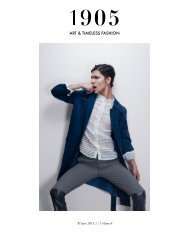Volume 06
Create successful ePaper yourself
Turn your PDF publications into a flip-book with our unique Google optimized e-Paper software.
REDUCING PLASTIC<br />
Written by Anaiah Lupton<br />
The difference between man and animal is the act of<br />
adaptation. Animals adapt to their surroundings and adjust<br />
to circumstance, where as humans change the world<br />
around them to fit their needs and adapt to the circumstances<br />
that they have created. Change is a requirement<br />
for human development and evolution, however we<br />
have created a society based off of instant gratification<br />
and we have blinded ourselves to consequences. One of<br />
our largest issues in this country is our instinct to say<br />
yes to products that promote ease, haste, quantity, and<br />
pre-packaging. In my last article I wrote about how I am<br />
spending this year transitioning to free trade clothing,<br />
and saying no to sweat shops. This act of consciousness<br />
began as a struggle and I felt like I was missing out on<br />
cute clothing. After a few months, I began to feel like I<br />
could breathe easier and I no longer felt like I was missing<br />
out on anything. This experience has inspired me to<br />
be conscious in other aspects of my life, specifically with<br />
trash. I am taking on the task to reduce my trash and<br />
say no to plastic. Although I do not plan on quitting<br />
cold turkey I plan on making subtle changes each day<br />
towards leaving a smaller plastic footprint.<br />
“Approximately 55% of 220 million tons of waste<br />
generated each year in the United States ends up in one<br />
of the over 3,500 landfills.”-Duke University, Center for<br />
Sustainability and Commerce. The plastic we accumulate<br />
everyday is typically disassociated and easily forgotten<br />
due to the trendy grab and go life style. This lack of<br />
consciousness perpetuates until we see it first hand, for<br />
instance when one finds more trash on the beach than<br />
seashells. As I have made the transition from buying<br />
sweat shop clothing to free trade clothing I have found<br />
that my fashion choices have shifted and I have found<br />
myself gravitating towards better forms of cotton and<br />
quality fabrics over the items I used to have. It has also<br />
changed my perspective on what I need. Rather than<br />
buying in quantity I am more focused on what use the<br />
item will have in over a year from now, “how long will<br />
I find this fashionable?” or “How long will this style be<br />
‘in’?”. These same questions can be asked when buying<br />
simple things like plastic containers, plastic utensils, and<br />
plastic food packaging-How long will I need/use? What<br />
happens to it when I am done with it? I hope that with<br />
this next transition of living minimally and reducing<br />
waste I will become more passionate about the things<br />
that I can buy over the things that I cannot buy.<br />
Part of this transition will include using more glass<br />
products such as Mason Jars. Thanks to my mom, she<br />
is helping me with this process by collecting jars for me<br />
at home to transport food, and water. These jars can<br />
be used as I make some of my own necessities such as<br />
toothpaste, deodorant, shampoo, and other day-to-day<br />
products. I have also saved some of the clothes I have<br />
outgrown to sew together bags, and napkins to reduce<br />
paper towel usage.<br />
Part of this life style will include buying products<br />
in bulk rather than buying pre-packaged items. Whole<br />
foods offers many products in bulk but they offer plastic<br />
bags and containers for transportation. Part of this<br />
mindset will involve being more conscious about providing<br />
my own bags and jars in order to retrieve groceries<br />
and house hold items.<br />
I reflected on my waste trail and realized that it is<br />
the day to day that weighs me down the most, whether<br />
it is a coffee to go, the plastic wrap around my sandwich,<br />
the straw I used in my drink, my plastic toothbrush<br />
or the packaging in my cabinets, I discovered my<br />
garbage is ubiquitous.<br />
In order to compensate for this new life style I will have<br />
to be diligent on being concenceous before going out<br />
by providing my own Tupperware, drinking glasses, and<br />
napkins. As apart of this culture I will have the most<br />
difficulty saying “no” for the times when I did not plan<br />
ahead, for instance, If I forget my drinking glass, I will

















